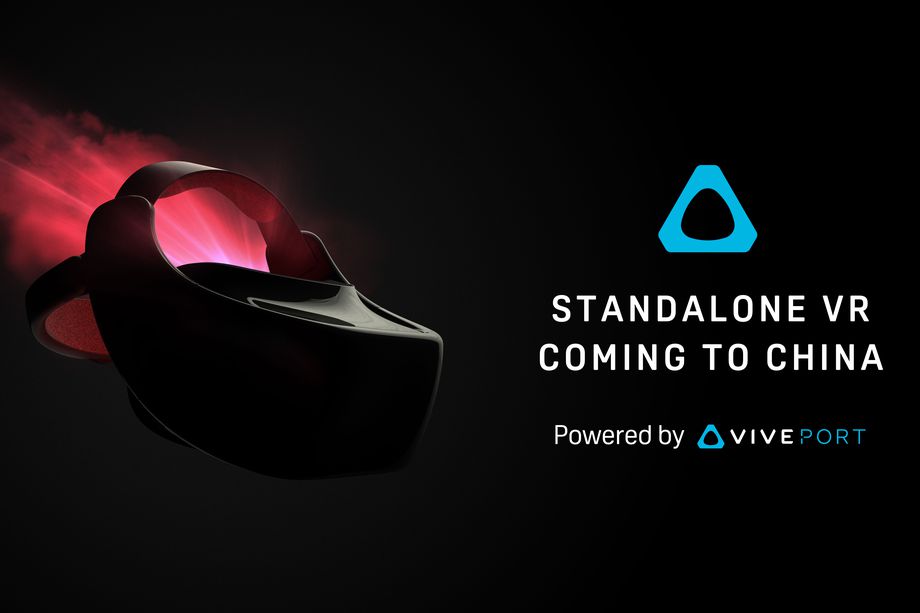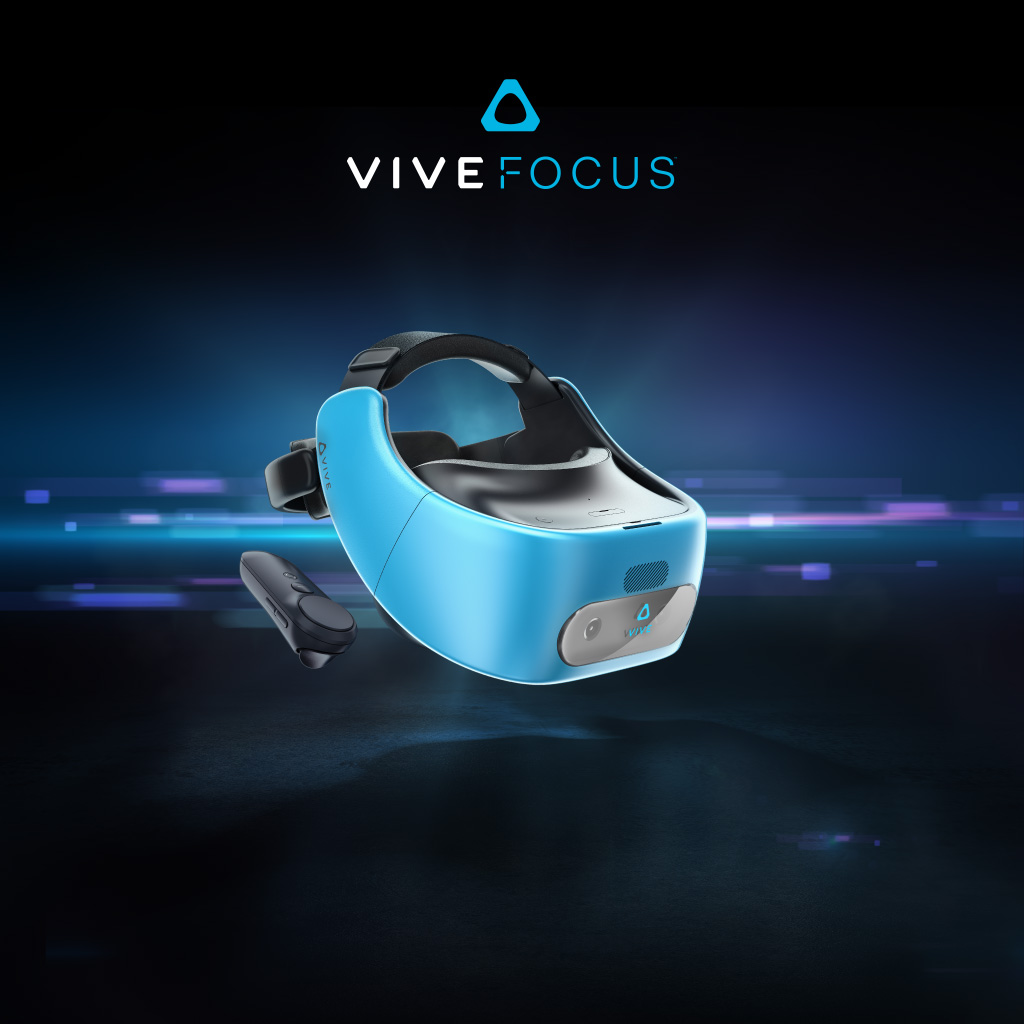HTC Announces Vive Wave Open Mobile VR Platform, Vive Focus HMD
HTC, hoping to curb mobile VR fragmentation in China, announced Vive Wave during the company’s annual Vive Developer Conference. Vive Wave is a toolset that lets developers support third-party mobile VR HMDs on HTC's Viveport content distribution system in China.
With China's VR market booming, the number of companies selling VR headsets, particularly for mobile, is also growing. Choice is great, of course, but when each device has its own content platform, it’s difficult for developers to support all systems, paving the way for one platform to dominate.
HTC is striving to prevent this scenario by offering a unified solution that supports a wide range of hardware. The Vive Wave platform purports to solve two industry problems: It gives software developers a larger potential customer base with no extra effort; and it frees hardware designers to focus on hardware innovation, rather than perfecting a software distribution system. HTC said that 12 hardware partners have already signed up to take part in Vive Wave. The company also revealed that 35 developers have committed to creating software for the Vive Wave platform.
HTC also said that it formed a partnership with Unity to integrate Viveport and the Vive Wave SDK into Unity to offer one-click publishing to the Viveport distribution platform. HTC said that the no-hassle publishing system would support Viveport for PC VR and mobile VR content.
“We’re delighted that the Vive Wave VR open platform is receiving such strong industry support from both hardware partners and developers,” said Alvin Wang Graylin, China Regional President of Vive, HTC. “As the VR industry leader in China, it is our duty to help reduce market fragmentation and provide content developers with more ways to make money. Vive Wave will assure a higher consistency in the user experience on a variety of mobile VR devices across various price points, making quality VR more accessible to the mass market.”
Along with the Vive Wave announcement, HTC discussed a few more details about its upcoming standalone VR headset for the China market. Over the summer, HTC announced that it would release a Snapdragon 835-powered VR HMD for China that would mirror the specifications of the standalone Daydream headset HTC is building for the global market. Today, the company announced that the headset would be known as the Vive Focus.
“As the world continues to become more mobile and connected, we’ve been working closely with Vive through our HMD Accelerator Program and advanced VR software features to enable immersive virtual reality experiences without the need for wires or PCs,” said Hugo Swart, senior director, product management, Qualcomm Technologies Inc. “The combination of Snapdragon’s ultra-low power, high performance VR coupled with the new Vive Wave VR open platform will help content developers deliver best-in-class mobile VR experiences to users.”
Get Tom's Hardware's best news and in-depth reviews, straight to your inbox.
HTC didn’t reveal many new details about the device, but the company confirmed that it would feature a low-latency, high-resolution AMOLED screen. The representative that we spoke with declined to discuss the full specifications of the hardware and would not say how much the Vive Focus would cost or when it would be available. The company did note that the Vive Focus would be the “first commercial standalone device to deliver inside-out 6-degree-of-freedom tracking (6DoF).”
Predictably, the Vive Focus headset is fully compatible with the Vive Wave open platform and Viveport content distribution system. In fact, HTC is offering Vive Vision headsets along with Vive Wave developer kits to qualifying developers. The company said that it handed out 500 priority vouchers to developers who were present at VDC 2017. HTC is also accepting applications for Vive Wave developer kits through the Chinese Vive developer hub.
Kevin Carbotte is a contributing writer for Tom's Hardware who primarily covers VR and AR hardware. He has been writing for us for more than four years.
-
computerguy72 The Focus VR seems to make no sense. Here HTC has built a community with the Vive that is entirely PC based so instead of iterating the design to try to command the market they put their efforts into a weaker non-pc solution. With 1/35th the processing power this is basically identical to the Oculus Go and a number of others. Not sure the VR market is the place to be a "Me-Too" manufacturer.Reply -
Sakkura Reply20376905 said:The Focus VR seems to make no sense. Here HTC has built a community with the Vive that is entirely PC based so instead of iterating the design to try to command the market they put their efforts into a weaker non-pc solution. With 1/35th the processing power this is basically identical to the Oculus Go and a number of others. Not sure the VR market is the place to be a "Me-Too" manufacturer.
This is not a replacement for the PC-based Vive. The hardware is not ready for a true gen 2 PC headset yet, and this doesn't hurt what they're doing on PC. It's just a concurrent thing. -
Dosflores Reply20376905 said:With 1/35th the processing power this is basically identical to the Oculus Go
The Oculus Go uses Snapdragon 821 and only features orientation tracking. The Vive Focus uses Snapdragon 835 and features full positional tracking. The Focus is undeniably better than the Go, just like the Vive was undeniably better than the Rift when they launched.
HTC doesn't want to be a "Me-Too" manufacturer; it wants to be the leading manufacturer. It already leads the PC-based VR market, and there's no better alternative from any other manufacturer in sight. It would make no sense to neglect the standalone VR market. -
bit_user Reply
The point @Dosflores alluded to about about Vive Focus being 6-DoF vs. Oculus Go's 3-DoF capability can't be overstated. This makes it a fundamentally different & superior product.20376905 said:The Focus VR seems to make no sense. Here HTC has built a community with the Vive that is entirely PC based so instead of iterating the design to try to command the market they put their efforts into a weaker non-pc solution. With 1/35th the processing power this is basically identical to the Oculus Go and a number of others.
Second, they're decidedly not opting to be a me-too ODM. That's the main point of this article! They're flicking a giant middle-finger at Google, Valve, and Microsoft. With Vive Wave and Viveport, they're jockeying for software platform primacy and to be the dominant content distribution channel of VR and AR content. This should hardly come as a surprise. I expect the aforementioned players will probably deprioritize their partnership activities with HTC, as they're now stepping up and donning the mantle of a full-fledged competitor.20376905 said:Not sure the VR market is the place to be a "Me-Too" manufacturer.

